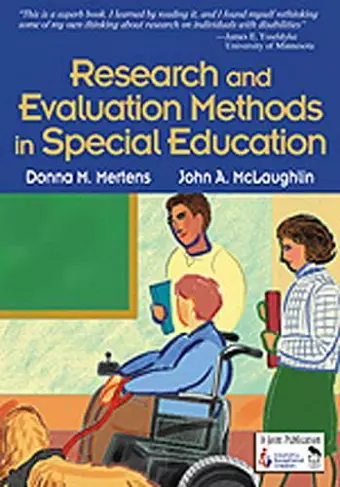Research and Evaluation Methods in Special Education
Format:Paperback
Publisher:SAGE Publications Inc
Published:10th Oct '03
Currently unavailable, and unfortunately no date known when it will be back
This paperback is available in another edition too:
- Hardback£75.00(9780761946526)

"In an era when government policy emphasizes ′scientifically based research′ (No Child Left Behind), this book provides an important resource in understanding what this means."
Diane Browder, Snyder Distinguished Professor of Special Education
University of North Carolina, Charlotte
"This is a superb book. I learned by reading it, and I found myself rethinking some of my own thinking about research on individuals with disabilities."
James E. Ysseldyke, Professor
University of Minnesota
Learn how research can lead to improved skills and contribute to successful lives.
When face-to-face with the challenge of providing special needs children with a quality education, teachers and other educators are often met with the dilemma of inadequate research on the topic, or they are uninformed that a framework for critically analyzing and conducting special education research exists. Research-based practice is a powerful tool for success, as it can inform educators and others about educational strategies that work.
Research and Evaluation Methods in Special Educationis intended to enable educators to design, conduct, and report research and evaluation in a way that transforms special education by addressing the needs of persons with disabilities as heterogeneous, cultural groups. This text provides practical guidance for:
- Planning research and evaluation
- Addressing the implications of legislation and program evaluation
- Using empirically based data for decision-making in a variety of settings
- Assessing additional research needs in areas such as standards-based reforms, personnel development, family involvement, and new and developing topics in special education
- Using quantitative research methods, including casual comparative, correlational, single case, and survey research
- Using qualitative methods, including identification and selection of research participants, information collection, and more
This excellent resource provides an approach to research and evaluation that helps educators better understand and address the needs of students with various disabilities, including blindness, mental retardation, deafness, learning disabilities, and more.
"In an era when government policy emphasizes ‘scientifically based research’ (No Child Left Behind), this book provides an important resource in understanding what this means."
-- Diane Browder, Snyder Distinguished Professor of Special Education"This is a superb book. I learned by reading it, and I found myself rethinking some of my own thinking about research on individuals with disabilities."
-- James E. Ysseldyke, Professor"The authors have set for themselves a challenging task--to enable readers to design, conduct, report, and understand research in a way that transforms (when appropriate) the delivery of special education. What is even more amazing is it appears they have developed a guide that makes this task a reality." -- CHOICE, June
ISBN: 9780761946533
Dimensions: unknown
Weight: 510g
296 pages